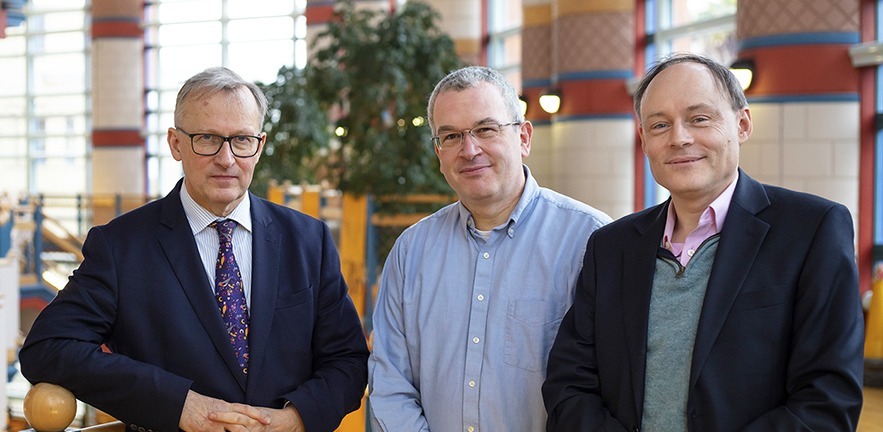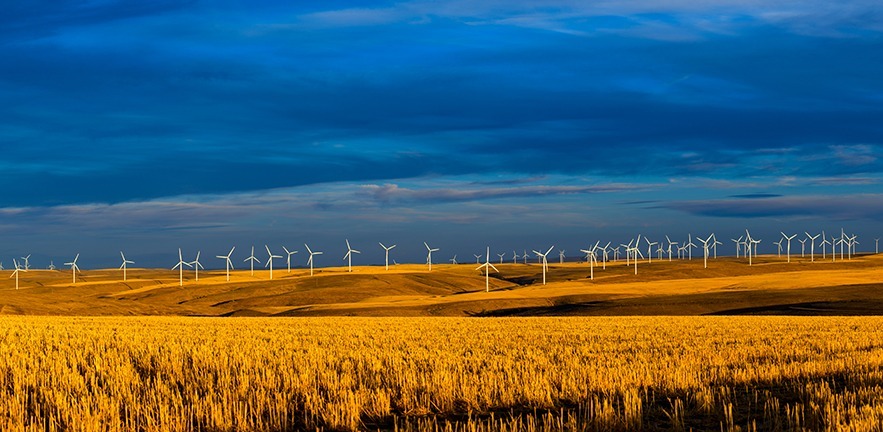A ‘tough sell’: why it is so difficult to address climate change on a global scale.

In this episode, joining podcast host Michael Kitson, University Senior Lecturer in International Macroeconomics at Cambridge Judge Business School, are Cambridge Judge faculty Michael Pollitt, Professor of Business Economics, and David Reiner, University Senior Lecturer in Technology Policy.
This is the 10th in a series of “Cambridge Judge Business Debate” podcasts featuring faculty and others associated with Cambridge Judge Business School and the broader Cambridge community.
This latest podcast focuses on energy policy – the nature of the challenges, the difficulty in addressing climate change, and a few bright spots surrounding wind and solar power.
Here is an edited transcript of some of the podcast discussion:
How has the challenge of energy and energy policy changed?
Michael Kitson: “One of the primary drivers of economic growth since the Industrial Revolution has been access to energy. But the industry is in transition and faces major challenges. The burning of fossil fuels has caused major damage to the environment. Many companies rely on international supplies of energy; this has been fine in a stable global economy, but with an increasingly fragmented global economy the issue of global energy security is becoming more important. What business model is best to deliver efficient and reliable sources of energy?”
David Reiner: “The way that we often describe some of the challenges and trade-offs in the energy sector is to talk about a trilemma, three competing areas: energy security, whether you have access to energy; economics, the impact on consumers and international competitiveness; and the environment, historically a focus on more local economic impacts but increasingly on more global impacts such as climate change. Part of the problem is that at different periods of time, different interest groups will prioritise those differently.”
Michael Pollitt: “The major challenge is that the world faces a massive climate, environmental challenge. That has led various parts of the world to set ambitious climate goals, including the European Union. Those have major implications for the energy sector, and if those goals are going to be realised it will require an energy transition. Fossil fuels are not running out in a meaningful sense; the actual problem is that fossil fuels are becoming easier to access, and that means that unless we have serious environment policy that is coordinated across the world there is no way we will meet these ambitious targets.”
There are some bright signs amid the gloom … perhaps
Michael Pollitt: “I’ve been more optimistic over the past few years, because we’ve seen a really quite spectacular reduction in the cost of wind and solar energy, which has at least raised the possibility we can address the environmental objectives we have at a reasonable cost. But we’ve still got to address seasonal availability of wind and solar; there are challenges inter-day to have sufficient energy available at a time when people want to use it.”
David Reiner: “The rapid reduction in the cost of solar panels and wind energy is great for remote villages in getting access to electricity; solar is better than relying on diesel generators. But since the Kyoto protocol in 1997, when the international community started to address the issues of climate change, emissions have continued to increase. It’s true that a few jurisdictions have made these very ambitious commitments, but it’s a global problem. So from the period 1997 to today, Chinese coal production has increased from one billion tons to three billion tons. It’s completely understandable: it’s driven by that other bit of the equation, living standards and providing quality of life to Chinese citizens, so we’ve seen them go from being energy poor to building essentially the equivalent of the UK grid in coal plants every year for the past 15 years.”
The West’s options are limited in addressing a global issue
Michael Kitson: “We certainly don’t want to get into the position where the West is trying to lecture other countries about development, which would really be pulling up the ladder. We’ve damaged the environment, so it would be a bit rich for us to go and say to other countries that you can’t follow the growth pattern we have because it would damage our environment.”
David Reiner: “Part of that equation is that China’s growth has also included a significant growth in steel production driven by coal, and we’re importing that steel and shutting down our own steel plants. This has implications for our economies, and we’re importing dirtier, more carbon-intensive steel.”
The role of the state and markets
David Reiner: “Electricity in many ways is easy: other than some wires that go between places like the UK and France it’s essentially localised to every country, so you don’t get into international competitiveness considerations. Government is in a better position to impose environmental restrictions on the power sector than in other areas.”
Michael Pollitt “It’s important to remember that the government has never got out of energy. We had a very intensive privatisation programme in the UK, but since then just about every investment made in our privately owned energy system is backed by a government policy. A better way of looking at it is to ask: what’s the value of market mechanisms in the energy sector? And the value there comes from innovation. We still need new ideas coming forward in transportation and heating and energy storage.”
Michael Kitson: “A pessimistic view is that we have both market and government failure here.”
Michael Pollitt: “The climate change challenge was identified in the 1980s as a global priority and we have made scarcely any progress there.”
David Reiner: “There’s a very strong logic for taking climate change action, but there’s now a big difference from how these issues were looked at in the past. When governments took action on smog in London or Los Angeles in the 1950s, the public could clearly see the physical improvement. The problem with climate change is that we’re talking about a counter-factual: the problem will continue to worsen but will it get much worse or a little bit less than that, and that’s a tough sell.”


